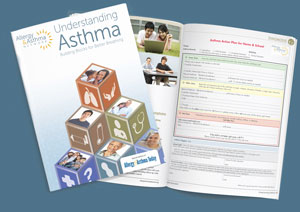Severe Asthma
- Home
- |
- What is Asthma?
- |
- What is Severe Asthma?
What is severe asthma?
Severe asthma is asthma that, despite all that you do:
- requires high-dose inhaled corticosteroids plus long-acting beta2-agonists and/or additional controller medication or
- requires oral corticosteroids to prevent it from becoming uncontrolled or remains uncontrolled despite therapy.
People with severe asthma often experience high rates of emergency department visits, hospitalizations and school or work absenteeism. They often find themselves unable to perform simple activities of daily living.
Once considered a single, though complex disease, asthma is now recognized as a syndrome or spectrum of diseases with environmental and genetic factors that cause airway inflammation and bronchospasm – leading to coughing, wheezing and shortness of breath. Severe asthma is one form of the disease.
Each person’s asthma experience is unique to them.


Quick 3-5 minute videos on asthma, allergies, and related conditions.
Asthma is a complex, ever-changing condition that requires constant attention. If your symptoms worsen, then a visit to an asthma specialist (board-certified allergist or pulmonologist) is in order.
How common is severe asthma?
It’s estimated that 5-10 percent of people with asthma have severe asthma. However, the percentage may be higher. Studies show about 50 percent of asthma patients have poorly controlled symptoms despite treatment.
Is there a difference between severe asthma and uncontrolled asthma?
Not all uncontrolled asthma is severe and not all severe asthma is uncontrolled. A person with mild or moderate asthma can have uncontrolled asthma.
Lack of control is defined using Baylor University’s Rules of Two ®. Your asthma is considered uncontrolled if you experience any or all of the following:
- You use your quick relief inhaler each week
- You need oral steroids
- You have asthma symptoms at night
- You have to refill your quick-relief inhaler often
Severe asthma is not always uncontrolled. Severe asthma is asthma that requires a higher level of daily treatment. The measure of severe asthma is based upon:
- How often you need your controller medication
- The frequency and duration of your asthma symptoms
- The impact of asthma on your daily life
There are several asthma assessment tools you can use to determine if your asthma is in control or not:
Rules of Two
Asthma Control Test
for adults
Asthma Control Test
for children ages 4 to 11 years and teens 12 and older
Asthma Control & Severity Assessment Tool
How is severe asthma diagnosed?
Severe asthma is diagnosed when your symptoms are not well controlled with your asthma medications. Those medications may include:
- inhaled corticosteroids
- short- and long-acting beta2-agonists (SABA, LABA)
- leukotriene inhibitors such as montelukast
- long-acting muscarinic inhibitors (LAMA).
What are asthma phenotypes?
A phenotype is a collection of characteristics. An asthma specialist will first identify characteristics of your asthma using skin and blood tests, FeNO (fractional exhaled nitric oxide) measurements, sputum analysis and/or bronchoscopy. For some patients, high serum IgE levels and/or high eosinophil counts and high FeNO levels are associated with increased symptoms and asthma flares.
For some patients, high serum IgE levels and/or high eosinophil counts and high FeNO levels are associated with increased symptoms and asthma flares. For others, thickening of airway smooth muscle may be the primary contributor.

Learn about Biological Medications: What they are, how they work, and who might benefit ➤
Treatments for Each Severe Asthma Phenotype
Researchers have identified four different asthma phenotypes. Each phenotype responds best to its own targeted treatment.
| Asthma Phenotype | Characterized by difficult-to-treat asthma plus: | Targeted Treatment |
|---|---|---|
| Allergic asthma (IgE) | Total serum IgE = 30-700 IU/ml and demonstrated IgE-mediated hypersensitivity to a perennial allegen | Add anti-IgE biologic • omalizumab |
| Eosinophilic | Blood eosinophils > 300 cells/uL and 2 or more exacerbations requiring OCS in past year OR >=150 cells/uL and 3 or more exacerbations requiring OCS in past year | Add anti-IL-5 biologic • mepolizumab • reslizumab • benralizumab Add anti-IL4/IL13 biologic •dupilumab |
| Neutrophilic | Sputum neutrophils in patients who do not respond to high-dose corticosteroids and do not have other type 2 markers | Consider adding a macrolide antibiotic |
| Airway smooth muscle (ASM) hypertrophy | Patient who doesn't qualify for other targeted therapies and/or has tried and failed targeted therapies for which s/he might be eligible and demonstration of variable airflow obstruction by bronchodilator reversibility | Consider bronchial thermoplasty, an outpatient medical procedure, in addition to regular treatment |
What is Type 2 inflammation?
Recent treatment breakthroughs focus on a certain type of airway inflammation. This is called Type 2 inflammation. Type 2 inflammation is a systemic allergic response involving high levels of immunoglobulin E (IgE) antibodies and white blood cells called eosinophils. It can result in increased likelihood of asthma flares. Approximately 50-70% of asthma patients have Type 2 inflammation.
Type 2 asthma is also known as e-asthma or eosinophilic asthma.
Learn more about eosinophilic asthma. >>
How can immunotherapy help severe allergic asthma?
If you have allergic asthma, you should consider talking with your doctor about allergen immunotherapy. Immunotherapy can reduce some underlying triggers of asthma such as pollen, mold, house dust mites and pet dander. It may also decrease the severity of your symptoms over time.
It’s important to have a discussion with a board-certified allergist who can evaluate your symptoms and help you determine the best immunotherapy option for you.

What other factors that may play a role in assessing your asthma severity and treatment options?
Other factors that may play a role in assessing asthma severity and treatment options, including:
- Inhaler technique
- Medication adherence
- Allergen avoidance
- Stress management
- Access to treatment
- Cost of treatment
What should I take to my doctor appointments if I’m concerned I might have severe asthma?
It helps to prepare for your doctor’s visits when you’re concerned about your asthma. These tools can help you cover everything you want to communicate with your care provider.
What Tools Can Doctors Use for Asthma Patient Visits
A checklist helps move the office visit along with patients with uncontrolled asthma
Steps to Shared Decision Making
What are the long term effects of inadequate asthma control?
The body’s attempts to correct the damage from inflammation can also lead to airway remodeling. Airway remodeling means that permanent structural and functional changes in the lung occur due to inflammation. For this reason, it is very important to work with your doctor to get the best asthma control that you can.
English Version
Spanish Version

Get a Free Copy of Our "Understanding Asthma" Guide ➤
Are there other conditions that may look like asthma or complicate asthma?
There are other types of respiratory conditions that are different than asthma. The symptoms, diagnosis and treatment can vary depending upon the condition. Here are some of them.
See Related Pages
- Asthma Attack
- Asthma Camp
- Alternative and Natural Asthma Treatments
- Asthma Symptoms & Triggers
- Asthma Medication and Treatment
- Asthma Diagnosis and Testing
- Lifestyle Changes to Manage Asthma
- Asthma Management and Control
- Asthma Patient Assistance
- Asthma Action Plan
- What is Severe Asthma?
- Asthma and Exercise
- Asthma in Babies and Children
- Asthma and Pregnancy
- Vaping and Smoking with Asthma
- Asthma Dictionary
- Asthma Statistics
- Asthma Webinars
- Ask the Allergist About Asthma
